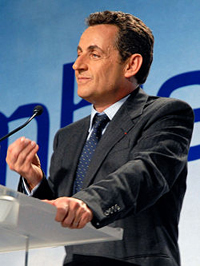French transport stike enters second day

Transport workers paralyzed most rail traffic in France for a second full day Thursday, making passengers postpone trips, work or bike to work.
The government awaited a response to its offer to negotiate a way out of the strikes - the first major challenge to President Nicolas Sarkozy's plan to modernize France with vast reforms.
Sarkozy wants the strike to end "as quickly as possible," his spokesman said Wednesday night, and offered company by company talks in the presence of a government representative to find a solution.
Labor Minister Xavier Bertrand, in a letter to seven union chiefs, said negotiations should commence "rapidly" and be completed in a month.
However, authorities made clear that the principles guiding a plan to reform special retirement benefits for transport and utilities workers, in place for more than 60 years, could not be touched.
"The president of the Republic has always considered that there is more to be gained for all parties in negotiation than in conflict," presidential spokesman David Martinon said. The strikes "must end as quickly as possible in the interest of passengers."
For the head of the Workers Force union, Jean-Claude Mailly that may not be good enough. "Everything must be on the table," he said Wednesday night.
The president is known as someone in a rush to accomplish his goals - and to sweep aside barriers. His call to get out of the strike quickly suggested that Sarkozy did not want to risk seeing his reforms unravel. Paring down the system of special retirement benefits is emblematic of his bid to sweep away what he sees as obsolete practices.
Both the state train authority, the SNCF, which began its strike Tuesday night, and the Paris transport system said conditions had improved on the second full day of the walkout.
The SNCF said that 150 fast trains out of 700 were running Thursday, compared to 90 the day before, while the RATP which governs Paris public transport said that only one subway line was fully shut down while traffic varied on other lines, from one train in five to one train in two.
The streets of Paris were clogged with pedestrians and those on bicycles making their way to the office. The city's new rent-a-bike service was popular.
Authorities have said the Eurostar train between Paris and London was not to be affected by the strike.
The government as well as unions are seeking an honorable compromise in the standoff over Sarkozy's bid to pare down special pension benefits for a few privileged sectors, such as train drivers who currently retire at 50. The moneysaving device that would affect a half-million workers is meant to spur growth and put all French on the same footing.
Utilities workers and employees of opera houses - whose curtains stayed closed Wednesday - are among those who would lose special benefits.
Sarkozy's agreement to the company by company talks proposed by powerful CGT union boss Bernard Thibault was seen as a breakthrough.
However, Prime Minister Francois Fillon said the heart of the reform was "not negotiable."
In his statement, the presidential spokesman was softer, saying that "concrete proposals" from all sides "will naturally be examined."
This was the second transport strike in less than a month, but an Oct. 18 walkout - more crippling than the current one - was meant as no more than a warning. The current strike, with daily votes on whether to continue, was meant to wear the government down.
Subscribe to Pravda.Ru Telegram channel, Facebook, RSS!


